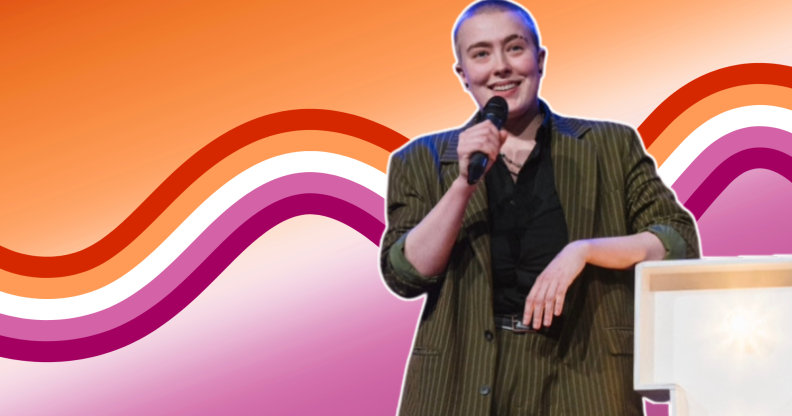How my butch identity taught me to uplift lesbians who are being left out of the conversation

Amy Wilson is a volunteer at the LGBTQ+ Charity Just Like Us. (Amy Wilson/Supplied)
I’ve been described as “one of those lesbians”. I have tattoos and piercings, I wear so-called men’s clothes and the only hair I shave is on my head.
Some people see it as a political statement, but it’s not. I’m just me, existing in a way that’s comfortable.
Finding the word “butch” was freeing. Knowing that there are other lesbians like me out there, who found their home in masculinity, gave me words for feelings I’d had since I was a young tomboy. I felt I’d found my place.
Well, I did – until another lesbian called me a “living stereotype” and said I was making us all look bad.
As a baby butch who’d only just worked up the courage to shave her head, this threw me. On pressing her, she explained that she felt all she saw of lesbians on TV were people like Big Boo from prison drama Orange Is the New Black, and that a lot of lesbians who chose to look like me did so to escape misogyny.
I wish I could tell younger me that none of that is true. Mainstream media still sorely lacks butch representation, and, as someone currently dating another butch, I don’t think I’ve ever seen a couple like us on TV.
There is nothing wrong with looking like a stereotype, whatever that means, and I have experienced just as much misogyny as when I presented as more feminine. Being butch doesn’t protect me and my partner from having things yelled at us in the street or worrying if we’ll get treated differently at work if we mention who we’re seeing.
Now, I think I have a better understanding of why that girl spoke to me the way she did. For many LGBTQ+ people, blending into a heteronormative society, convincing heterosexual, cisgender people that we’re just like them, means being safer. I imagine that distancing herself from lesbians different to her – lesbians like me – was a way of protecting herself.
‘Visibility should shine a light on who needs our support right now’
I think about this idea a lot. I go to Pride and no one’s wearing a mask, there are no wheelchair ramps, and I wonder how lesbians with disabilities can enjoy themselves.
I check out a list of recommended lesbian TV shows; there are two women of colour out of 50 couples. I see a lesbian talk that costs money to enter at 3pm on a weekday, and I know the discussion will centre on middle-class lesbians. I come across a social media post by a lesbian asking why she needs to care about trans people when she’s not trans.
Lesbian visibility, for me, is not about saying: “We exist, we’re just like you.” I wish it could be.
Instead, right now, a girl is trying to navigate the lesbian dating scene while only one year into a five-year wait to begin her medical transition. Another can’t marry her girlfriend without losing her disability benefits. A couple are having to access a food bank because neither has had a job since the pandemic.
Another gets racial abuse hurled at her in a gay club, where she’s supposed to be safe.
Visibility should shine a light on who needs our support right now. The words “solidarity” and “community” get thrown around a lot in LGBTQ+ spaces, but when we prioritise our own visibility over the people whose lesbianism intersects with other identities, we fail to live up to either of these values.
For me, being a lesbian is informed by the fact I am gender-non-conforming, just as a friend of mine is informed by the fact that she is Black and working class, just as for another it’s informed by her autism.
We frequently leave disabled, trans, working-class lesbians, and lesbians of colour, out of our activism and “decentre” them from the conversation. As a white, able-bodied lesbian, I know I’ve done this.
This Lesbian Visibility Week – which ends on Sunday (28 April) – however unthinkingly or purposefully we do these things, this needs to change. Rather than seeing intersecting identities as a marker of difference, I hope we can value intersectionality and amplify the voices of those who don’t share our experiences.
Amy volunteers as an ambassador for Just Like Us, the LGBTQ+ young people’s charity. If you’re 18-25 and LGBTQ+, you can sign up here.

